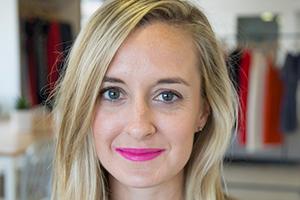Communications
SOC Alumna Uncovers the Numbers Behind #MeToo

Over the past year, Hollywood repeatedly made headlines with high-profile stories of sexual assault and abuse by powerful men, such as Harvey Weinstein. The number of revelations in the wake of the #MeToo movement led USA TODAY to survey hundreds of women working in Hollywood to get an idea of how prevalent sexual assault is in the industry.
The result: 94 percent of respondents said they’d experienced some form of sexual harassment or assault in their careers.
Of the 843 women in Hollywood’s entertainment industry who responded to the survey, almost all of them had experienced sexual assault to some degree. The survey led to gut-wrenching video interviews where the women described some of the treatment they faced."
“After the Weinstein news broke last year, I developed the idea for my favorite project to date, called ‘The 94 Percent,’” said Cara Kelly, a 2011 journalism and public affairs alumna and enterprise reporter for USA TODAY. “It led to a series with a half-dozen stories, plus incredible video and audio components, that wrapped just last week.”
Kelly said she’s covered the #MeToo movement over the past year primarily from a Hollywood perspective, but also worked on USA TODAY’s coverage of the allegations against U.S. Supreme Court Justice Brett Kavanaugh during his confirmation hearing.
The #MeToo movement opened Kelly’s eyes to investigative reporting, she said, and now she is transitioning to a new role on USA TODAY’s investigative team. As the engagement reporter, she works to package content to reach the largest audience possible and encourage them to interact with different parts of a story.
“This may be brainstorming unconventional story forms or putting together a social strategy,” Kelly said. “I also work on my own stories and projects. Some are quick-turn enterprise pieces off of the news cycle and some are longer term investigations.”
Confidence in the newsroom
After graduating in 2011, Kelly began working for The Washington Post as a producer in the Style section before becoming a digital editor and overseeing the digital side of award shows and holiday guides. She went on to join The Post’s innovation team, which developed new products, such as apps.
After two years in that role, Kelly moved to USA TODAY and took over the entertainment blog — one of the highest performing in the USA TODAY network. She managed a team of 5-6 reporters and covered events like award shows and the royal wedding. In August, she moved to the investigative team.
Kelly said her experience at AU gave her the confidence she needed to excel in big-time newsrooms.
“I had worked previously for local and alt-weekly papers, but AU helped me get to the next level,” Kelly said. “By covering things like hearings on Capitol Hill and elections while in school, I was able to learn what would be expected of me at the Post and USA TODAY. I also learned the digital skills – and more importantly, how to always be open to new technology – that has been my most marketable quality.”
The AU Experience
Kelly was drawn to AU’s cutting-edge digital instruction and its connections to some of the country’s top newsrooms. She also liked that its Washington, D.C., location would give her access to some of the biggest stories in the country.
In her time at AU, Kelly said she enjoyed learning from professors like Chuck Lewis, Lynne Perri, Jane Hall, Bill Gentile and John Watson. She said she highly recommends taking any class Watson teaches.
“My best piece of advice: Take full advantage of the amazing professors and programs offered at AU, they will lead to the education and connections you need to land a job in this competitive industry,” Kelly said.
Kelly said she particularly enjoyed working with Amy Eisman, the director of the School of Communication’s Journalism Division.
“Amy Eisman is such an amazing person and professor that I can’t say enough good things about her and what she’s done for the hundreds of us who have crossed her path,” Kelly said. “I’ve worked with so many AU grads who she taught or helped find a job that we’ve jokingly called her the fairy godmother of digital journalism.”